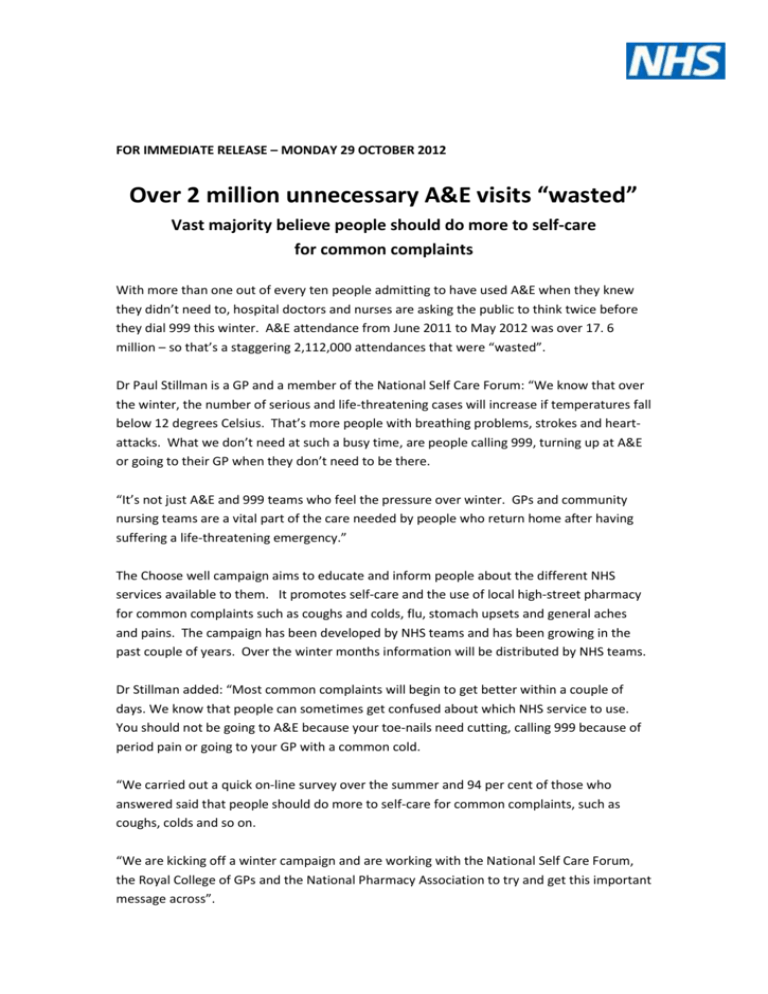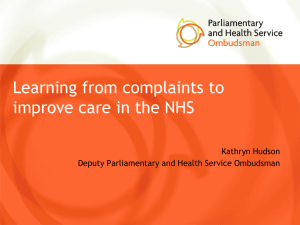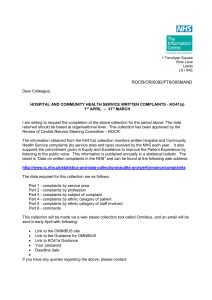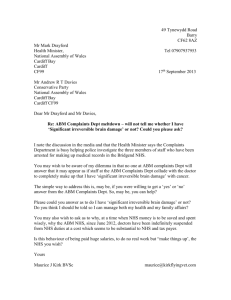Over 2 million unnecessary A&E visits “wasted”
advertisement

FOR IMMEDIATE RELEASE – MONDAY 29 OCTOBER 2012 Over 2 million unnecessary A&E visits “wasted” Vast majority believe people should do more to self-care for common complaints With more than one out of every ten people admitting to have used A&E when they knew they didn’t need to, hospital doctors and nurses are asking the public to think twice before they dial 999 this winter. A&E attendance from June 2011 to May 2012 was over 17. 6 million – so that’s a staggering 2,112,000 attendances that were “wasted”. Dr Paul Stillman is a GP and a member of the National Self Care Forum: “We know that over the winter, the number of serious and life-threatening cases will increase if temperatures fall below 12 degrees Celsius. That’s more people with breathing problems, strokes and heartattacks. What we don’t need at such a busy time, are people calling 999, turning up at A&E or going to their GP when they don’t need to be there. “It’s not just A&E and 999 teams who feel the pressure over winter. GPs and community nursing teams are a vital part of the care needed by people who return home after having suffering a life-threatening emergency.” The Choose well campaign aims to educate and inform people about the different NHS services available to them. It promotes self-care and the use of local high-street pharmacy for common complaints such as coughs and colds, flu, stomach upsets and general aches and pains. The campaign has been developed by NHS teams and has been growing in the past couple of years. Over the winter months information will be distributed by NHS teams. Dr Stillman added: “Most common complaints will begin to get better within a couple of days. We know that people can sometimes get confused about which NHS service to use. You should not be going to A&E because your toe-nails need cutting, calling 999 because of period pain or going to your GP with a common cold. “We carried out a quick on-line survey over the summer and 94 per cent of those who answered said that people should do more to self-care for common complaints, such as coughs, colds and so on. “We are kicking off a winter campaign and are working with the National Self Care Forum, the Royal College of GPs and the National Pharmacy Association to try and get this important message across”. Jane Cummings is Chief Nursing Officer for England and is also supporting the Choose well campaign: "I would ask everyone to think carefully about how they use A&E, 999 and GP services this winter. It is important that nurses, doctors and other NHS staff in these teams are free to treat people with serious and life-threatening illnesses and injuries as quickly as possible. If it was one of your parents, your partner or one of your children who had needed emergency treatment, you wouldn't want them to have to wait a second longer than they need to." Advice and information about a range of common winter health complaints, including how long symptoms will last and how to relieve symptoms is available from NHS Choices at www.nhs.uk You’ll find an easy to use symptom checker, can search for your local services and use the interactive First Aid toolkit. ENDS NOTES TO EDITORS: For more information please contact the press office on 07824 463578 1. Paul Stillman works in a large busy general practice in Crawley, Sussex. He is trainer and director of one of the UK's largest vocational training schemes, the British Postgraduate Medical Federation. He also writes extensively, and makes appearances on both radio and television. Dr Stillman is an advocate for the National Self Care Forum 2. There were 650 responses to an on-line survey to measure people’s attitudes to selfcare for common health complaints. A summary of the results showed that: 94 per cent agreed that people should self-care for common health complaints 87.5 per cent agreed that A&E and 999 services should only be used for lifethreatening emergencies 47.5 per cent thought that people go to their GP or use their A&E or 999 service for common complaints if they are worried their symptoms could be for something more serious 34 per cent believed that common complaints would get better by themselves without a GP appointment and that people should use their local pharmacy for advice for these conditions 46 per cent said that going to see a GP with a common complaint wastes valuable NHS resources and GP time, when they could be helping people with serious conditions 20 per cent said they thought that people need to take more responsibility for their own health 29 per cent thought that more education is needed 24 per cent believe that an information and advertising campaign 3. A report commissioned by the Proprietary Association of Great Britain (PAGB) states that 12 per cent of people who go to A&E admit attending when they don’t need to (Source: Making the case for the self-care of minor ailments – PAGB) 4. A&E attendance figures are published by the Department of Health and can be found at : http://www.dh.gov.uk/en/Publicationsandstatistics/Statistics/Performanceda taandstatistics/AccidentandEmergency/DH_087973 5. NHS teams across the country are backing the Choose Well campaign. Choose Well aims to give people information so that they know where to go to in the first instance, to get fast, expert advice when they need it, and how to help themselves if they have a common illness or ailment – and help ease the pressure on A&E and 999 services at the same time 6. If you or someone in your family has back pain, sore throat, flu, cough or cold, stomach upset or sports injury, there are a number of ways you can look after yourself in the first instance 7. Your symptoms should ease over a few days if you use some over-the-counter medicines that are available from your local chemist. Your high street chemist can give you expert advice. Always read the instructions carefully and make sure you don’t take more than the recommended dose 8. If your symptoms suddenly deteriorate or continue to get worse over a number of days, get an appointment to see your GP





